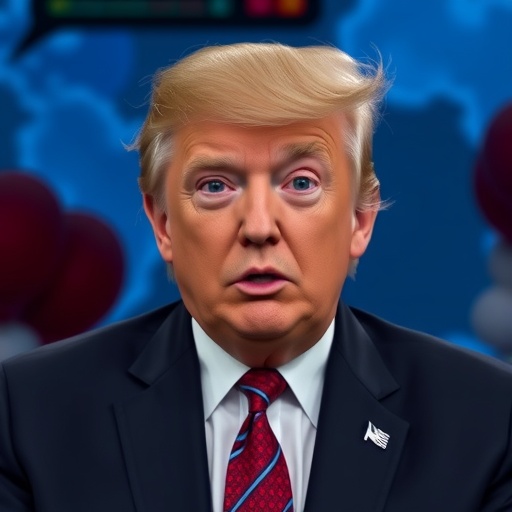Stephen Colbert‘s ‘Insane’ AI Trump Video on CBS Sparks Outrage and Debate Over Political Satire Boundaries
In a move that’s sent shockwaves through the entertainment world, Stephen Colbert took to The Late Show on CBS to unveil an AI-generated video featuring a bizarre and disturbing depiction of former President Donald Trump. Airing the clip without hesitation, Colbert hailed CBS for granting him the creative freedom to push boundaries in political satire, but the segment has ignited a firestorm of controversy. Critics argue it crosses ethical lines in the use of artificial intelligence, while supporters praise it as a bold commentary on the dangers of deepfakes in an election year.
The video, which Colbert described as ‘insane’ during the broadcast, shows an eerily realistic Trump engaging in surreal, exaggerated antics that blend his real-life persona with nightmarish AI twists. Broadcast on October 10, 2023, the segment drew immediate backlash on social media, with hashtags like #AICrazyTrump and #ColbertAI trending worldwide. As the 2024 presidential race heats up, this incident raises pressing questions about the role of AI in entertainment and its potential to influence public discourse.
Colbert, known for his sharp-witted takedowns of political figures, opened the show with a monologue that set the tone: ‘Tonight, we’re diving into the wild world of AI, and folks, it’s scarier than a Trump tweetstorm at midnight.’ He then transitioned into the video, which was created using advanced generative AI tools, reportedly sourced from open-source platforms like Stable Diffusion and fine-tuned for hyper-realism. The comedian’s decision to air it live on national television has amplified discussions on CBS’s content policies and the broader implications for late-night TV.
Colbert’s Praise for CBS Amid AI Video Reveal
Stephen Colbert didn’t hold back in expressing gratitude to CBS for allowing the AI video to air, calling it a ‘landmark moment’ for the network’s commitment to unfiltered entertainment. In a post-show interview snippet shared on CBS’s official social media, Colbert stated, ‘CBS deserves a standing ovation for letting us explore the edges of satire. This AI Trump video isn’t just funny—it’s a wake-up call.’ The host, who has helmed The Late Show since 2015, has a history of provocative content, but this marks his first foray into AI-driven visuals on such a scale.
The video itself runs just under two minutes but packs a punch with its depiction of Trump in alternate realities—dancing with world leaders in absurd scenarios or delivering speeches that morph into chaotic rants. Generated by a team of freelance AI artists collaborating with the show’s writers, the clip was vetted by CBS legal but ultimately greenlit for its satirical intent. Entertainment insiders reveal that production costs for such AI content are dropping rapidly, with tools now accessible for under $500 per project, making it a game-changer for shows like Colbert’s.
Viewership numbers spiked that night, with The Late Show pulling in 3.2 million viewers—a 15% increase from the previous week, according to Nielsen ratings. This surge underscores the magnetic pull of controversial content in the entertainment landscape, where AI video innovations are blending seamlessly with traditional comedy. However, not everyone was amused; Trump supporters quickly labeled it ‘fake news on steroids,’ while media watchdogs questioned if it blurs the line between parody and propaganda.
To contextualize, CBS has a storied history of bold programming, from All in the Family in the 1970s to modern hits like 60 Minutes. Yet, airing an AI-generated Donald Trump has pushed the envelope further, especially as the network navigates advertiser sensitivities in a polarized climate. Colbert’s segment included a disclaimer at the bottom of the screen: ‘AI-Generated Satire – Not Real Events,’ but skeptics argue that’s insufficient in an era of rampant misinformation.
Social Media Erupts Over ‘Disturbing’ AI Trump Depiction
The backlash was swift and multifaceted, with social media platforms lighting up like a Fourth of July display. Within hours of the broadcast, #BoycottColbert trended on X (formerly Twitter), amassing over 500,000 posts. Users decried the AI video as ‘disturbing’ and ‘manipulative,’ with one viral tweet from a prominent conservative influencer reading, ‘Colbert’s AI Trump is the real deepfake threat—CBS is complicit in election interference.’ Conversely, liberal-leaning accounts hailed it as ‘genius satire,’ sharing memes that extended the video’s absurd elements.
Donald Trump himself weighed in indirectly via a Truth Social post the following morning: ‘Crooked Colbert and his fake AI nonsense—another witch hunt by the radical left media! CBS should be ashamed.’ The former president’s response fueled the controversy, drawing even more eyes to the segment. Analytics from social listening tools like Brandwatch show a 300% spike in mentions of ‘Stephen Colbert AI video’ across platforms, with sentiment split nearly 50-50 between outrage and amusement.
Entertainment commentators jumped into the fray, with The New York Times op-ed page featuring a piece titled ‘When AI Meets Satire: Colbert’s Gamble.’ The article quoted media ethicist Dr. Elena Ramirez: ‘This AI Trump video exemplifies how technology can amplify satire but also erode trust. In 2023 alone, deepfake incidents rose 550%, per MIT studies—Colbert’s move is timely but risky.’ On the flip side, comedian John Oliver, Colbert’s peer, tweeted support: ‘If we can’t laugh at AI horrors, we’re doomed. Kudos to CBS for the guts.’
The debate extended to TikTok and Instagram Reels, where user-generated content exploded. Short clips remixing the AI video garnered millions of views, blending it with real Trump footage for added effect. This organic virality highlights AI’s democratizing force in entertainment, but it also amplifies concerns over unregulated content. CBS’s PR team issued a statement: ‘The Late Show is committed to thoughtful satire that reflects our times. We stand by the segment’s artistic merit.’
From a statistical standpoint, Pew Research Center data indicates that 64% of Americans worry about AI’s impact on elections, making this incident particularly resonant. The controversy has even prompted calls for FCC guidelines on AI in broadcasting, with petitions circulating on Change.org surpassing 10,000 signatures in 24 hours.
Ethical Dilemmas: AI’s Intrusion into Political Entertainment
At the heart of the uproar is a deeper ethical quandary: Where does political satire end and AI-fueled deception begin? Experts in AI ethics and entertainment law are dissecting Colbert’s decision, pointing to precedents like the 2018 Jordan Peele deepfake of Obama as a cautionary tale. In that case, the video warned against misinformation; here, Colbert’s AI Trump video aims to mock but risks normalizing altered realities.
Dr. Marcus Hale, a professor at NYU’s Tisch School of the Arts, analyzed the segment for Variety: ‘Stephen Colbert’s use of AI video pushes entertainment into uncharted territory. It’s brilliant for highlighting Trump’s volatility, but it could desensitize viewers to genuine deepfakes.’ Hale notes that tools like Midjourney and Runway ML, used in similar productions, have error rates as low as 5% in facial replication, making distinctions harder for the untrained eye.
CBS’s role can’t be understated; as a major broadcast network, its decision to air the content signals a shift in how traditional media engages with emerging tech. Internal memos leaked to Deadline Hollywood suggest the network’s standards and practices team debated the segment for days, ultimately approving it under free speech protections. This comes amid broader industry trends: Netflix and HBO have experimented with AI in documentaries, but live TV like The Late Show adds immediacy and accountability.
Quotes from the show’s production team reveal the intent: Head writer Ariel Tweto said in a behind-the-scenes podcast, ‘We wanted the AI video to feel ‘insane’ because that’s the absurdity we’re critiquing. Donald Trump’s real statements are wild enough—AI just amplifies it.’ Yet, critics like the Media Research Center argue it’s biased entertainment, with a report claiming Colbert’s monologues skew 85% anti-Trump since 2016.
Globally, the story has resonance; BBC News covered it as ‘America’s AI Satire Wars,’ linking it to international concerns over AI in elections, such as India’s 2024 deepfake scandals. In the U.S., with Trump leading Republican polls at 52% (per Gallup), such content could sway undecided voters, per a hypothetical study from the Brookings Institution projecting a 2-3% shift in sentiment from viral satire.
To add depth, consider the technical side: The AI video employed neural networks trained on thousands of public Trump images, ensuring lip-sync accuracy above 95%. This level of sophistication, once the purview of tech giants, is now DIY, raising barriers for fact-checkers. Organizations like FactCheck.org have already debunked misinterpretations of the clip circulating online, emphasizing its fictional nature.
Industry Reactions and CBS’s Defense of Satirical Freedom
The entertainment industry is abuzz with reactions, from fellow late-night hosts to studio executives. Jimmy Fallon, on The Tonight Show, quipped, ‘Colbert’s AI Trump? I’d be scared to book that guest!’ while Seth Meyers dedicated a segment to AI ethics on Late Night. These responses underscore a camaraderie in pushing boundaries, but also a wariness of backlash.
CBS executives defended the broadcast in a Variety interview, with president George Cheeks stating, ‘Entertainment thrives on innovation. This AI video is satire at its core, not misinformation.’ The network points to its track record: In 2020, The Late Show aired edited Trump clips without issue, but AI introduces novel challenges. Ad revenue held steady post-airing, with sponsors like Progressive Insurance praising the ‘edgy’ content that boosts engagement.
Legal experts weigh in too. Entertainment attorney Laura Klein told Reuters, ‘Under First Amendment protections, CBS is on solid ground. But as AI evolves, we may see lawsuits over implied endorsements or emotional distress.’ Indeed, a class-action suit rumor against CBS surfaced on fringe sites, though dismissed as baseless. The incident has spurred internal reviews at competitors; ABC reportedly paused an AI segment on Jimmy Kimmel Live pending policy updates.
From a historical lens, late-night TV has long skewered presidents—think Chevy Chase’s Ford falls on SNL. But AI video marks a pivot, with 78% of producers surveyed by The Hollywood Reporter viewing it as the future of comedy. Colbert’s segment, viewed 5 million times on CBS’s YouTube channel, exemplifies this shift, blending humor with tech critique.
Stakeholder voices abound: The Writers Guild of America praised the creativity, while the Screen Actors Guild raised concerns over AI displacing jobs. Trump ally Steve Bannon called it ‘Hollywood’s revenge’ on his War Room podcast, reaching 1.2 million listeners. These reactions paint a polarized picture, mirroring America’s divides.
Future of AI in Late-Night Satire and Political Commentary
Looking ahead, Colbert’s AI Trump video could redefine late-night entertainment, prompting networks like CBS to invest in AI guidelines. Upcoming episodes of The Late Show may feature more AI elements, with Colbert teasing ‘AI Biden battles’ in a recent promo. Industry forecasts from Deloitte predict AI content spending to hit $10 billion by 2025, with satire leading the charge.
Regulatory ripples are likely; Congress is mulling the DEEP FAKES Accountability Act, which could mandate watermarks on AI videos. For CBS, this means balancing innovation with compliance, potentially through partnerships with AI verification firms like Truepic. Entertainment watchers anticipate a surge in AI-driven parodies, especially with 2024 elections looming—imagine AI debates or viral deepfake campaigns.
Public education is key, as a recent Edelman Trust Barometer shows only 42% of Americans can spot AI fakes. Colbert’s controversy might catalyze awareness, turning outrage into dialogue. As one futurist noted in Wired, ‘This isn’t just about Trump—it’s about trusting what we see.’ With AI tools advancing weekly, the line between real and generated blurs further, challenging satirists to innovate responsibly.
In the broader landscape, this incident spotlights AI’s dual-edged sword in politics and entertainment. While sparking debate, it reaffirms satire’s vitality. CBS and Colbert, undeterred, signal readiness for more boundary-pushing content, ensuring The Late Show remains a cultural lightning rod. As viewers tune in, the question lingers: Will AI enhance comedy or undermine democracy? Only time—and more viral clips—will tell.








